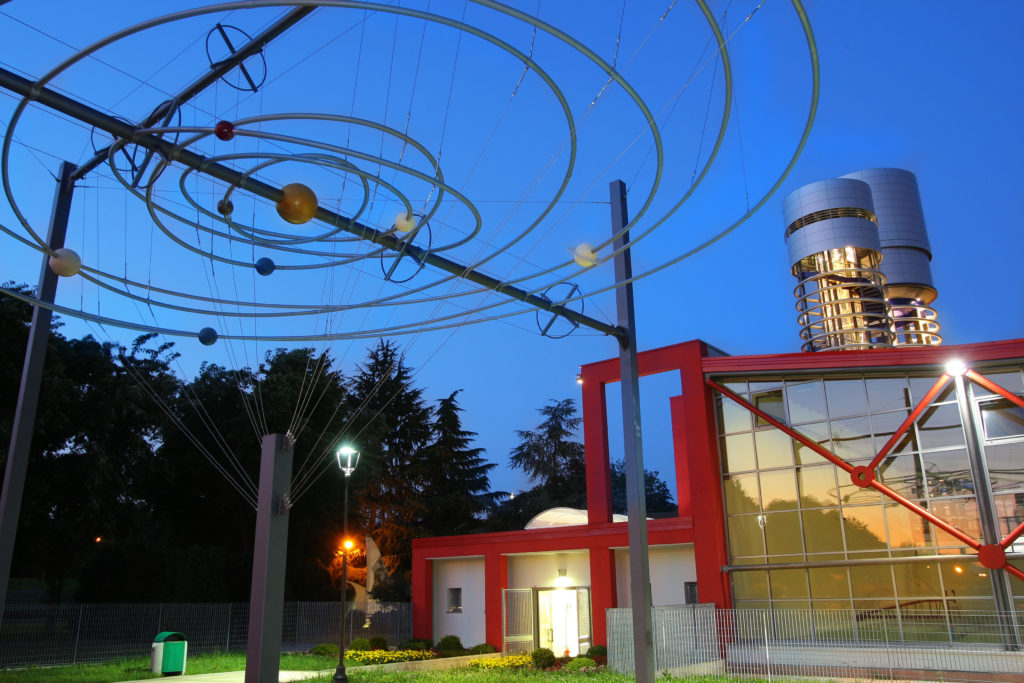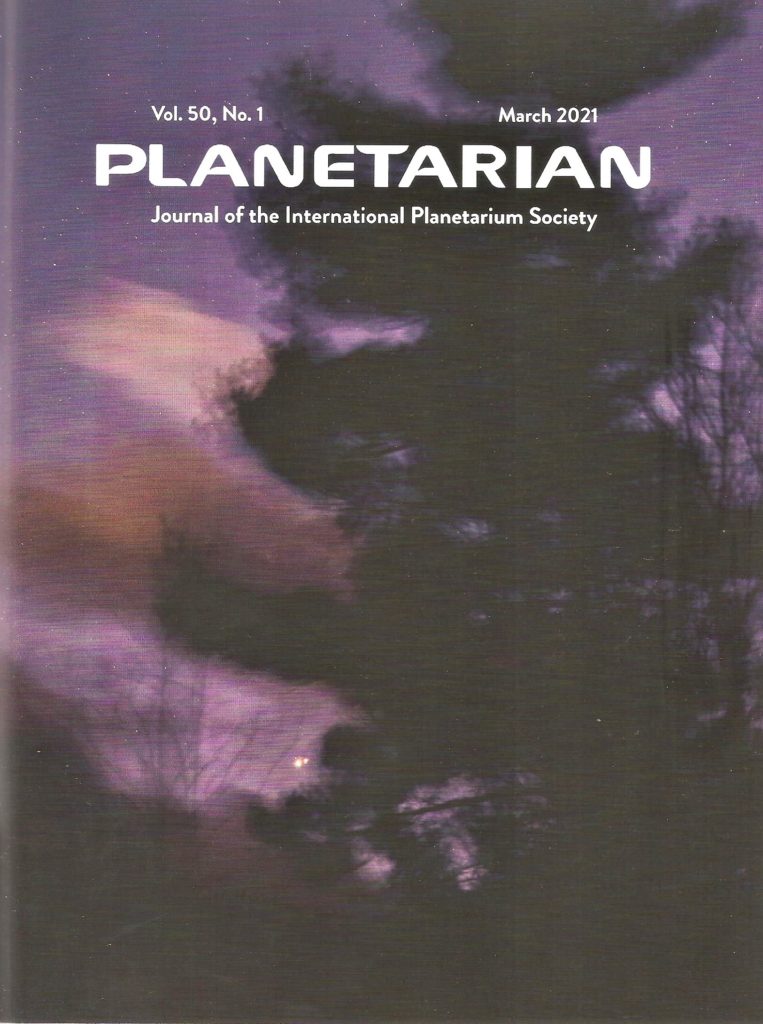
As a consequence of protracted restrictions due to the COVID-19 crisis which has forced schools to resort to online lessons, PLANit (Association of Italian Planetariums), has opened a page on its website where it publishes all proposals put forward by Italian planetariums to overcome the teaching/learning difficulties encountered by both teachers and students. There are about one hundred Italian planetariums, but most are small and do not have sufficient staff to participate in online activities, while some of the medium-large or large ones are able to do so. At the following link you can find all the initiatives that the Association has received, of which a descriptive summary is provided in this article:
http://www.planetari.org/it/index.php?option=com_content&view=article&id=242&Itemid=709
The Amelia (Terni Province) Planetarium, despite the lock-down, has not given up looking at the sky! Thus it has tried to respond to schools’ requests by focusing on multidisciplinary and practical training through online laboratory lessons. Starting from October 2020, the planetarium has acquired two new tools for teaching and dissemination. The first is an all-sky camera: a sort of web-cam with a fish-eye lens which records the sky 24 hours a day (1).
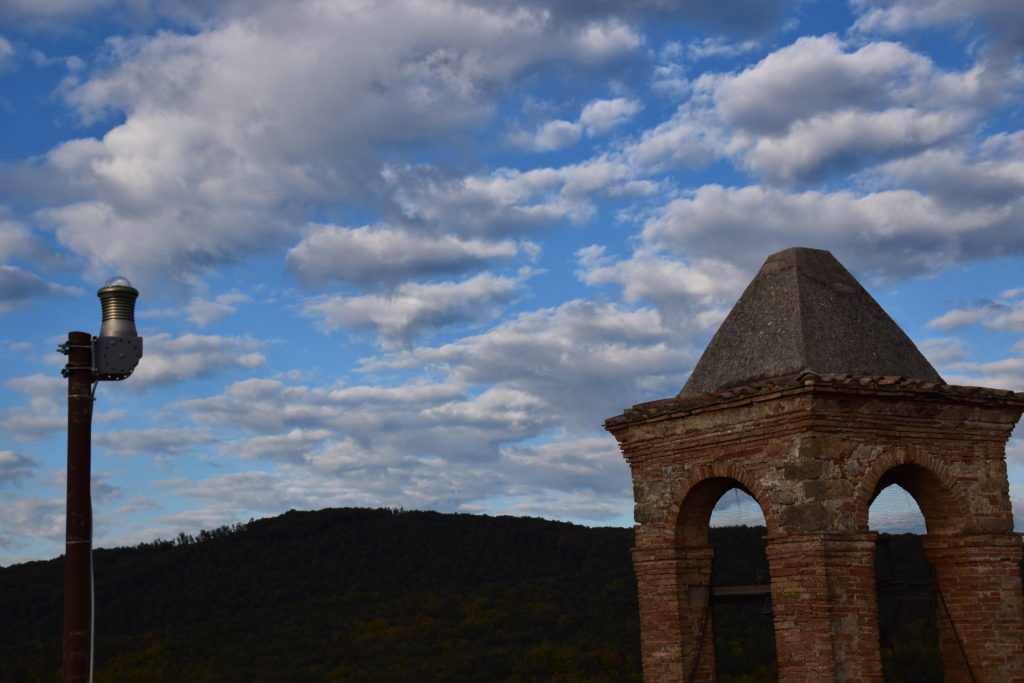
The camera transmits real-time photos of the sky above the convent where the planetarium is situated, providing meteorological data for those who love observations with telescopes. But this all-sky cam has other potentials: the recorded videos are processed in real time by software which can recognize the images in which a meteorite or a fireball appear. For this reason the system is part of the national INAF network (National Institute of Astrophysics) for monitoring racing cars, named PRISMA (www.prisma.inaf.it). By comparing data obtained from the various centres scattered throughout the country, PRISMA aims to determine the trajectories of racing cars and to circumscribe the area of possible impact of fragments that may have survived without crumbling when crossing the Earth’s atmosphere. We can say that the Amelia Planetarium now helps to hunt for “shooting stars” and meteorites! The second recently installed instrument is a Davis Vantage Pro 2 weather station (2), which every 15 seconds provides real-time updated data on:
Temperature: current, maximum, minimum and internal (in the convent attic).
Wind: current speed and maximum gust, direction.
Atmospheric pressure: minimum, maximum, trend.
Position of the sun.
Rain: current, daily, rate of fall.
Moon phase.
All data can be displayed as instantaneous values, or graphed with a time scale selected by the user. The weather station also provides useful information for planning observation activities with telescopes more accurately and is at the service of Planetarium users. Both tools are easily accessible using the appropriate widget at (www.planetariodiamelia.org).
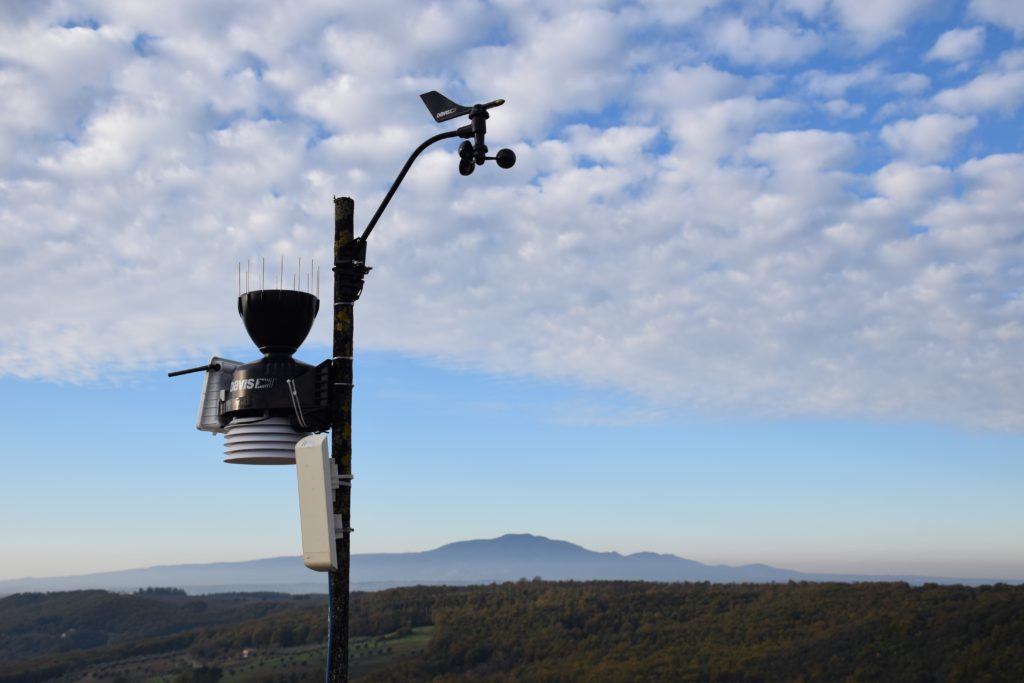
The Planetario Infinito in Turin has expanded its teaching syllabus for the 2020/21 school year to include a series of activities on Online Educational, so as to continue and integrate learning through new methodologies which have become necessary due to the COVID crisis.
Students and teacher can connect both from home and from the classroom with IWB or PC with webcam and microphone, tested before the activity. The Internet connection must guarantee at least 5 Mbps in Download and 1 Mbps in Upload, Latency less than 50 ms. Any other materials, tools, and IT equipment are detailed in the various proposals, which can be distance teaching activities or Planetarium shows. Some initiatives are free, others for a fee and their details are published on the website. All activities are distance-conducted by Infini.to educators, including the sky shows, produced for distance education using the Planetarium. Customized Activities are also carried out on request, planned together with teachers in one or more meetings.
The Ravenna Planetarium (3) in a school year full of unknowns and limitations has also tried to meet new challenges and exploit opportunities while maintaining its purpose, that is to explain and apply the experimental method, starting from observation of the Sky. It has reformulated its educational activities which are normally carried out in the Planetarium, and has adopted an online approach. A path has been developed consisting of three distinct modules, differentiated for each school level.
EDUCATIONAL WORKSHOPS, single online meetings divided into two phases. An initial online observation phase uses the digital planetarium Stellarium to observe individual celestial phenomena whih are explored later, and to reconstruct the lines of the starry sky. A second laboratory phase follows, in which students and teachers apply the expert’s instructions for the activities they have chosen (design of star maps, construction of small instruments, etc.). A final phase is planned in the dome, when it will be possible to return to face-to-face work.
ARTICULATED PATHS, intended for elementary and middle school students, designed around different themes and consisting of several phases:
• Preliminary phase of teacher training conducted by an expert;
• First workshop;
• Research path that teachers and the class conduct independently;
• Concluding workshop, where an overview of the various topics is created.
In addition to the final intervention, it is possible to carry out a telescope observation of the Sky, made through digital live or remote footage through the observatory.
700th ANNIVERSARY OF THE DEATH OF DANTE ALIGHERI
On the seven hundredth anniversary of the death of Dante Alighieri, who lived in Ravenna from 1318 to 1321, where he died during the night between 13th and 14th September, the Planetarium thought of creating an educational module which could also be adapted for an online version to bring elementary and middle school children closer to Dante’s work through presentations on various themes, such as “The Observation of the Sky of Time”, “Mythology and Philosophy from the Ancient Greeks to the Middle Ages”. Two-phase videoconferences are planned for high schools: 1) an observation phase through the digital planetarium Stellarium to recognize the main constellations of the period; 2) deepening of a theme of individual choice (for example, The Middle Ages and the Art of Astronomy; Dante Alighieri and the Universe of the Divine Comedy) via videoconference which will remain available to students and teachers as educational material, with relative bibliographical references.
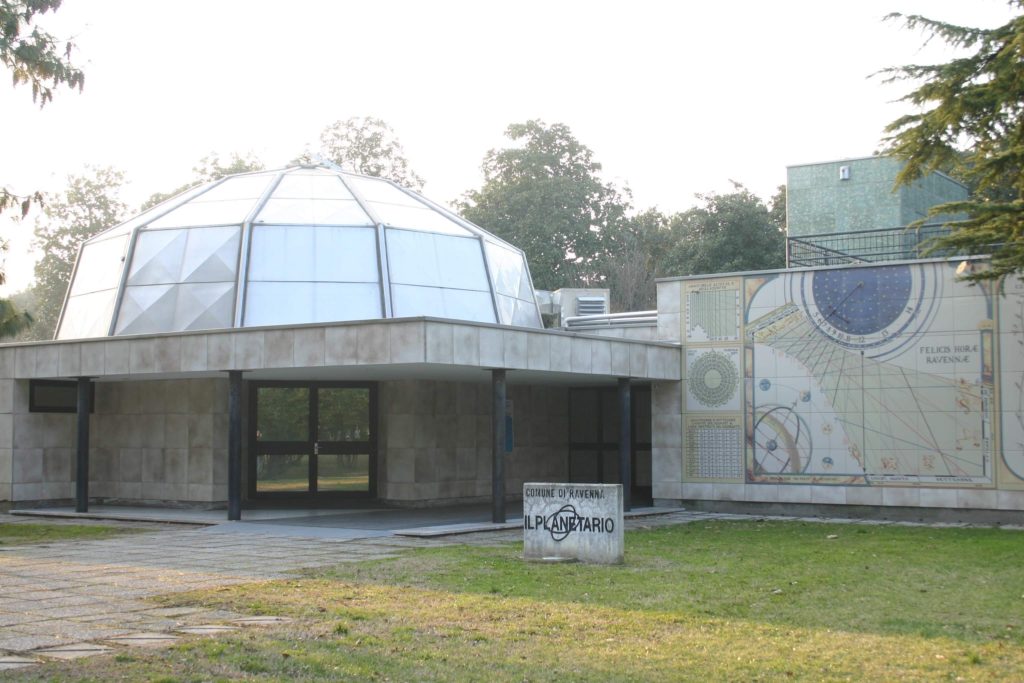
Planetarium of Reggio Calabria The impact of the Italian state school system’s digital revolution caused by Covid-19 was unimaginable, but the crisis has given a decisive impetus to the development of the technological knowledge that increasingly plays a fundamental role in the world of work and education today. The pandemic has imposed distance learning, and this has upset traditional teaching and learning approaches but has at least guaranteed educational continuity for students. Distance learning is a tool that certainly cannot replace traditional teaching but permits a more innovative, dynamic, transverse approach. Furthermore distance learning is helping to improve students’ – and teachers’ – digital skills, a positive aspect not to be underestimated. Astronomy, more than other sciences, lends itself to distance learning because many activities are carried out remotely with remote telescopes, simulators, planetariums, and mathematical models that process data collected from space. The use of “Moodle”-type platforms allows teachers to set exercises and interactive tests and allows students to self-evaluate. The Planetarium already has this type of platform created to prepare students for the various phases of the Astronomy Olympics. Mathematics, Physics, Astronomy, Astrophysics and Cosmology glossaries are about to be added, along with examples of exercises and interactive tests with interdisciplinary contents. In the first half of 2020, the Planetarium had already implemented distance learning with excellent results in preparation for the Italian Astronomy Olympics. In the months to come it is also preparing to carry out the PCTOs, again via video link. The students who were preparing for the Olympics followed video lessons three times a week. During the lessons they were divided into Junior1, Junior2 and Senior categories, and worked on exercises in elementary astronomy and cosmology. The Planetarium has organized preparation courses for all stages of the competition from regional to international. As regards remote development of PCTOs, students will participate in conferences and lessons through the digital Planetarium and viewing through the telescope connected remotely. The great possibilities of the new IT tools allow entire classes to take part in the lessons at the Planetarium via their home computer. The Planetarium experts, connected via camera and microphone, share the screen on which they work to operate the digital Planetarium, thus enabling children to participate in how to use the digital planetarium and how to prepare and carry out a lesson. Some evening meetings also include connection with a remote telescope: children are instructed in the operation of the telescope and the use of techniques and various programs of acquisition and processing of astronomical images.
StarLight, a handy planetarium (Perugia). Between November and December 2020 Starlight organized a cycle of three lessons for high school students, held by Dr. Gloria Andreuzzi, researcher of the TNG (National Galileo Telescope) at the Roque del Los Muchachos in La Palma in the Canary Islands. The lessons lasted one hour, divided into 45 minutes of lectures and 15 of interaction with students with the following topics as their theme: Astronomy and the Electromagnetic Spectrum; the Doppler Effect and Exoplanets; the Roque del Los Muchachos and the Galileo National Telescope. During the first six months of 2021 the cycle will be repeated for students in a different school.
The Torre del Sole Planetarium in Brembate (Bergamo Province) (4) To integrate schools’ educational activities, the planetarium offers remote interventions carried out by its operators to learn about and deepen various topics relating to astronomical sciences. The service is carried out using the Google MEET platform, unless otherwise agreed. The class receives a link to use on the agreed day and time.
The program includes:
VARIOUS CONFERENCES (duration: about 1h 30m for a fee) to deepen some astronomical themes with the help of the most up-to-date images.
HELIOPHYSICAL LABORATORY: OBSERVATION OF THE SUN (duration: about 2 hours for a fee) to learn about our star, observe the phenomena that develop on its surface, and understand the mechanisms by which the energy emitted warms and illuminates our planet.
ASTRONOMY COURSE (three meetings of about 1h 30m each for a fee) which, starting from the Earth, leads to the discovery of the bodies of the Solar System and beyond, to the ends of the universe.
THE SKY IN A ROOM: THE VIRTUAL PLANETARIUM (duration: about 1h 30m for a fee) is based on the use of a computer simulation program that is one of the most modern and complete tools for astronomical dissemination, with infinite educational resources using the latest media and digital technology.
